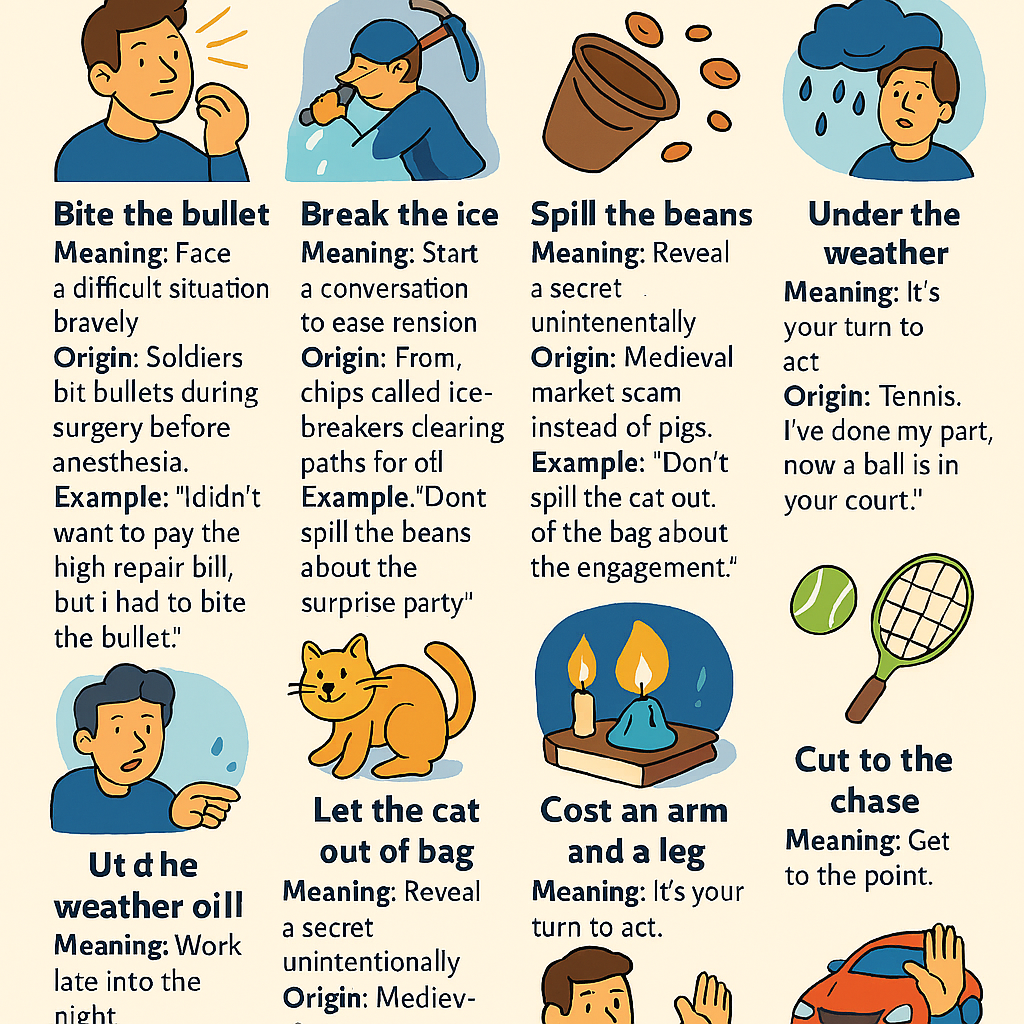1. Bite the bullet
- Meaning: Face a difficult situation bravely.
- Origin: Soldiers bit bullets during surgery before anesthesia.
- Example: “I didn’t want to pay the high repair bill, but I had to bite the bullet.”
2 Break the ice
- Meaning: Start a conversation to ease tension.
- Origin: Icebreaker ships cleared paths for others.
- Example: “He told a joke to break the ice at the meeting.”
3. Kick the bucket
- Meaning: To die.
- Origin: From animals hung on a beam called a “bucket” during slaughter.
- Example: “Sadly, the old dog finally kicked the bucket.”
4. Spill the beans
- Meaning: Reveal a secret.
- Origin: Ancient Greek voting with beans.
- Example: “Don’t spill the beans about the surprise party!”
5. Under the weather
- Meaning: Feeling ill.
- Origin: Sick sailors sent below deck during storms.
· Example: “I’m feeling a bit under the weather today.”
6. Let the cat out of the bag
- Meaning: Reveal a secret unintentionally.
- Origin: Medieval market scam with cats instead of pigs.
- Example: “She let the cat out of the bag about the engagement.”
7. Burn the midnight oil
- Meaning: Work late into the night.
- Origin: Oil lamps were used before electricity.
- Example: “I had to burn the midnight oil to finish the report.”
8. Throw in the towel
- Meaning: Give up.
- Origin: Boxing—throwing a towel signals defeat.
- Example: “After several failed attempts, he threw in the towel.”
9. Cost an arm and a leg
- MeaningCostlyve.
- Origin: Portrait painters charged more for limbs.
- Example: “That luxury car costs an arm and a leg.”
10. The ball is in your court
- Meaning: Your turn to act.
- Origin: Tennis term.
- Example: “I’ve done my part; now the ball is in your court.”
11. Hit the nail on the head
- Meaning: Describe something exactly right.
- Origin: Carpentry—hitting the nail squarely.
- Example: “You hit the nail on the head with that analysis.”
12. Steal someone’s thunder
- Meaning: Take credit for someone else’s idea.
- Origin: Playwright John Dennis accused others of stealing his thunder sound effect.
- Example: “She stole my thunder by announcing the news first.”
13. Raining cats and dogs
- Meaning: Heavy rain.
- Origin: Possibly from 17th-century England, when heavy rain washed dead animals into the streets.
- Example: “It’s raining cats and dogs outside!”
14. Barking up the wrong tree
- Meaning: Pursuing a mistaken course.
- Origin: Hunting dogs barking at the wrong tree.
- Example: “If you think I broke the vase, you’re barking up the wrong tree.”
15. Beat around the bush
- Meaning: Avoid being too direct.
- Origin: Hunting—beaters flushed birds from bushes indirectly.
- Example: “Stop beating around the bush and tell me the truth.”
16. By the skin of your teeth
- Meaning: Barely succeed.
- Origin: Biblical phrase (Book of Job).
- Example: “He passed the exam by the skin of his teeth.”
17 Once in a blue moon
- Meaning: Very rarely.
- Origin: Refers to the rare second full moon in a month.
- Example: “We only go out for fancy dinners once in a blue moon.”
18. Cut to the chase
- Meaning: Get to the point.
- Origin: Silent films—skip to the exciting chase scene.
- Example: “Let’s cut to the chase and discuss the main issue.”
19. Throw caution to the wind
- Meaning: Take a risk.
- Origin: 19th-century English literature.
- Example: “He threw caution to the wind and invested in the startup.”
20. Elephant in the room
- Meaning: An obvious problem everyone ignores.
- Origin: 19th-century fable about ignoring a massive elephant in a room.
- Example: “We need to address the elephant in the room: declining sales.”
